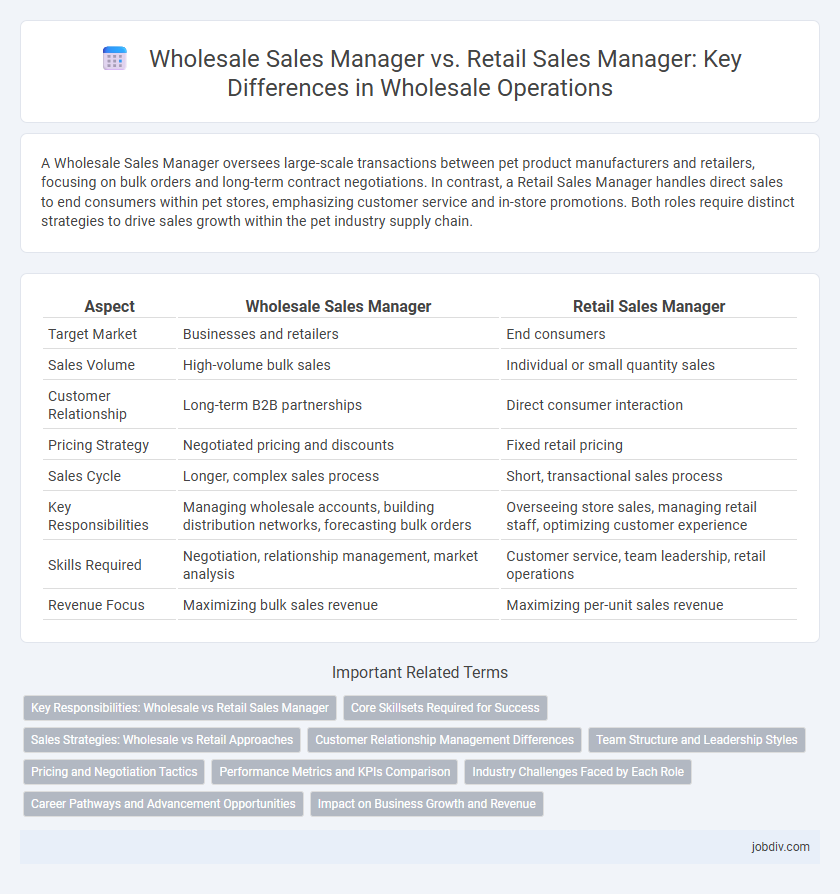A Wholesale Sales Manager oversees large-scale transactions between pet product manufacturers and retailers, focusing on bulk orders and long-term contract negotiations. In contrast, a Retail Sales Manager handles direct sales to end consumers within pet stores, emphasizing customer service and in-store promotions. Both roles require distinct strategies to drive sales growth within the pet industry supply chain.
Table of Comparison
| Aspect | Wholesale Sales Manager | Retail Sales Manager |
|---|---|---|
| Target Market | Businesses and retailers | End consumers |
| Sales Volume | High-volume bulk sales | Individual or small quantity sales |
| Customer Relationship | Long-term B2B partnerships | Direct consumer interaction |
| Pricing Strategy | Negotiated pricing and discounts | Fixed retail pricing |
| Sales Cycle | Longer, complex sales process | Short, transactional sales process |
| Key Responsibilities | Managing wholesale accounts, building distribution networks, forecasting bulk orders | Overseeing store sales, managing retail staff, optimizing customer experience |
| Skills Required | Negotiation, relationship management, market analysis | Customer service, team leadership, retail operations |
| Revenue Focus | Maximizing bulk sales revenue | Maximizing per-unit sales revenue |
Key Responsibilities: Wholesale vs Retail Sales Manager
A Wholesale Sales Manager primarily oversees bulk product distribution, negotiates large-volume contracts with retailers or distributors, and manages supply chain logistics to ensure product availability. In contrast, a Retail Sales Manager focuses on direct customer engagement, store operations, merchandising, and sales strategies to enhance the in-store customer experience and drive individual sales. Both roles require leadership and sales forecasting but differ significantly in their target audiences and operational scopes.
Core Skillsets Required for Success
Wholesale Sales Managers excel in negotiation, supply chain management, and B2B relationship cultivation, emphasizing bulk sales strategies and market analysis to drive large-scale orders. Retail Sales Managers prioritize customer service, visual merchandising, and inventory control, focusing on enhancing the in-store experience and maximizing individual transaction value. Both roles demand strong leadership, communication, and analytical skills to effectively manage their teams and meet sales targets in their respective markets.
Sales Strategies: Wholesale vs Retail Approaches
Wholesale Sales Managers deploy strategies centered on bulk transactions, long-term contracts, and relationship building with distributors to maximize volume and maintain steady supply chains. Retail Sales Managers prioritize customer engagement, promotional campaigns, and in-store experiences to drive individual sales and enhance brand loyalty. Wholesale approaches emphasize efficiency and large-scale deals, while retail strategies focus on personalized service and immediate consumer demand.
Customer Relationship Management Differences
Wholesale Sales Managers prioritize managing relationships with bulk buyers and distributors, emphasizing long-term contracts and volume-driven negotiations. Retail Sales Managers focus on direct consumer interactions, tailoring customer service to individual preferences and in-store experiences. Both roles utilize Customer Relationship Management (CRM) tools, but wholesale managers often leverage data for account-based marketing, while retail managers use CRM to enhance personalized promotions and loyalty programs.
Team Structure and Leadership Styles
Wholesale Sales Managers typically lead larger, specialized teams focused on B2B client relationships, employing a directive leadership style to drive sales targets and manage complex negotiations. Retail Sales Managers oversee diverse in-store teams, emphasizing customer service and frontline employee motivation with a participative leadership style to enhance shopper experience. The team structure in wholesale is more hierarchical and segmented by product lines, while retail relies on a collaborative, floor-based team approach for operational efficiency.
Pricing and Negotiation Tactics
Wholesale Sales Managers leverage volume-based pricing strategies and negotiate bulk discounts to secure competitive deals with large buyers, emphasizing long-term contracts and flexible payment terms. Retail Sales Managers focus on fixed pricing models and employ consumer-oriented negotiation tactics such as promotions and loyalty rewards to maximize individual sales. Understanding these distinct negotiation approaches is crucial for optimizing profitability in wholesale versus retail sales environments.
Performance Metrics and KPIs Comparison
Wholesale Sales Managers prioritize metrics like large order volumes, average transaction size, and account retention rates, reflecting their focus on B2B relationships and bulk sales efficiency. Retail Sales Managers emphasize foot traffic conversion rates, individual transaction values, and customer satisfaction scores to drive in-store performance and consumer engagement. Both roles rely on sales growth and profit margins, but their KPIs align closely with their distinct market channels and sales strategies.
Industry Challenges Faced by Each Role
Wholesale Sales Managers face challenges such as managing large-volume contracts, navigating complex supply chains, and maintaining competitive pricing in bulk transactions. Retail Sales Managers encounter difficulties with high customer turnover, inventory management for diverse product assortments, and adapting to rapid shifts in consumer behavior. Both roles require strategic coordination but differ fundamentally in scale and customer interaction dynamics.
Career Pathways and Advancement Opportunities
Wholesale Sales Managers typically oversee large-scale transactions between manufacturers and businesses, focusing on volume sales, contract negotiations, and supply chain coordination, which opens career pathways into regional sales director roles or corporate sales strategy positions. Retail Sales Managers concentrate on direct consumer engagement, store operations, and merchandise presentation, providing advancement opportunities toward district manager roles or retail operations leadership. Both career paths require strong leadership and sales expertise but differ in their market focus and scalability of sales strategies.
Impact on Business Growth and Revenue
Wholesale Sales Managers drive substantial business growth and revenue by securing large-volume contracts with distributors and key accounts, leveraging economies of scale to maximize profit margins. Retail Sales Managers influence revenue through direct consumer engagement and optimizing in-store sales performance, enhancing customer loyalty and repeat purchases. Wholesale channels often yield higher revenue growth rates due to bulk transactions, while retail channels focus on sustained growth via customer experience and brand presence.
Wholesale Sales Manager vs Retail Sales Manager Infographic

 jobdiv.com
jobdiv.com